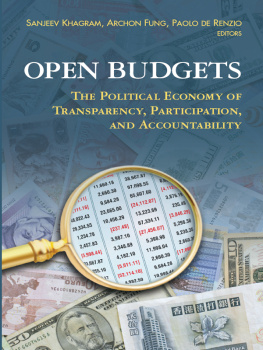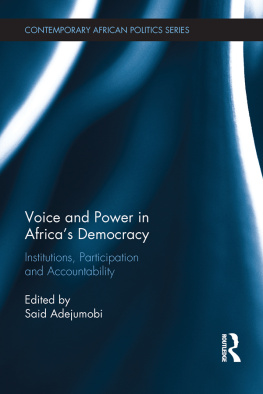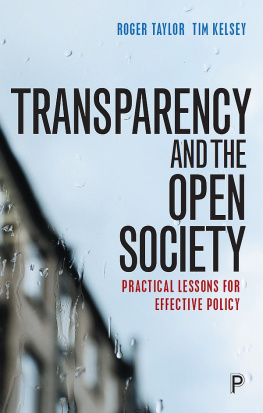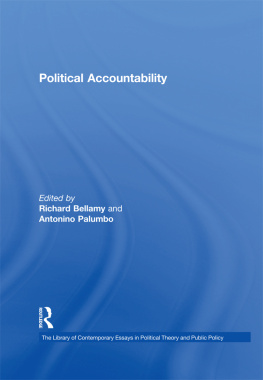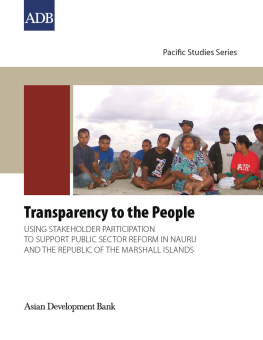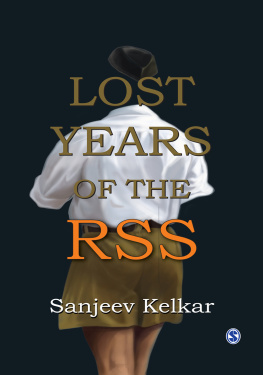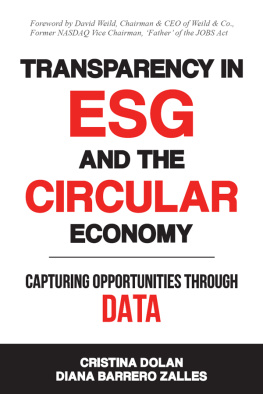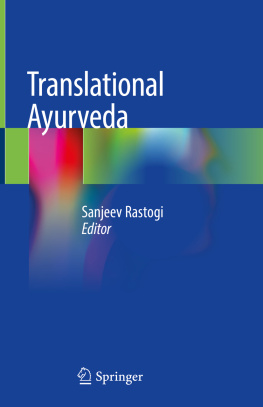THE BROOKINGS INSTITUTION
The Brookings Institution is a private nonprofit organization devoted to research, education, and publication on important issues of domestic and foreign policy. Its principal purpose is to bring the highest quality independent research and analysis to bear on current and emerging policy problems. Interpretations or conclusions in Brookings publications should be understood to be solely those of the authors.
Copyright 2013
THE BROOKINGS INSTITUTION
1775 Massachusetts Avenue, N.W., Washington, D.C. 20036
www.brookings.edu
All rights reserved. No part of this publication may be reproduced or transmitted in any form or by any means without permission in writing from the Brookings Institution Press.
Library of Congress Cataloging-in-Publication data
Open budgets : the political economy of transparency, participation, and accountability / Sanjeev Khagram, Archon Fung, and Paolo de Renzio, editors.
pages cm
Includes bibliographical references and index.
ISBN 978-0-8157-2337-0 (pbk. : alk. paper)
1.Finance, Public. 2. Budget. 3. Transparency in government. 4. Government accountability. I. Khagram, Sanjeev. II. Fung, Archon, 1968 III. De Renzio, Paolo.
HJ141.O64 2013
352.4dc23
2013004914
9 8 7 6 5 4 3 2 1
Printed on acid-free paper
Typeset in Adobe Garamond
Composition by R. Lynn Rivenbark Macon, Georgia
Printed by R. R. Donnelley Harrisonburg, Virginia
Overview and Synthesis: The Political Economy of Fiscal Transparency, Participation, and Accountability around the World
SANJEEV KHAGRAM, PAOLO DE RENZIO AND ARCHON FUNG
R aising, allocating, and spending public resources are among the primary functions and policy instruments of any government. Government budgets, as well as off-budget fiscal instruments such as state-owned enterprises and sovereign wealth funds, profoundly affect economies, societies, and ecoystems. Decisionmaking around government revenues and expenditures has historically been shrouded in secrecythe purview of heads of state, finance ministers, and central bankers, along with a few select officials in executive agencies. Often, other ministries, government branches (including parliaments), the business community, civil society organizations, and the broader citizenry have had little or no access to information on public financial management. The quantity and quality of engagement and the inclusion of these nonexecutive actors in fiscal decisionmaking and oversight processes have been severely limited.
In recent years, however, interest and action with respect to transparency, participation, and accountability in fiscal decisionmaking have surged around the world. Indeed, over the past two decades, several broad trends have brought fiscal transparency, participation, and accountability into sharp focus:
The proliferation of good governance norms and standards that emphasize greater transparency, participation, and accountability in all government matters,
Numerous transitions from closed, authoritarian political regimes to ones characterized by policy contestation, separation of powers, political party competition, an organized civil society, an engaged citizenry, and an active media,
The introduction of modern public finance management systems and good practices in countries around the world,
Greater decentralization and devolution of powers to subnational levels of government, including the power to raise, allocate, and spend public resources,
The growth in the number and operational capacity of independent civil society organizations (CSOs) seeking to be informed about and actively participate in government decisionmaking, and
The dramatic growth, spread, and use of information and communication technologies around the world.
The global financial and economic crises that began in 2008 further revealed that the disclosure of government fiscal risks and positions was inadequate. This lack of transparency contributed to government fiscal crises in many countries (epitomized by Greece), which created additional perverse incentives for governments to cloud rather than open their fiscal data. Ordinary citizens began calling for greater accountability in the use of public resourcesfrom the streets of Athens and the Arab spring to the tea party and Occupy Wall Street movements in the United States.
Given the fundamental importance ofand increased focus onthese issues and trends in the global economy, it is surprising to find that rigorous analysis of the causes and consequences of fiscal transparency, participation, and accountability is thin at best. This volume seeks to fill this gap in existing knowledge, deploying multiple research methodologies and examining a range of quantitative and qualitative evidence.
We focus on three broad sets of questions. First, how and why do improvements in fiscal transparency and participation come about, and how are such changes sustained over time? That is, what are the key factors and causal mechanisms that contribute to improvements or regressions in these aspects of fiscal decisionmaking? Second, under what conditions and through what type of mechanisms do (or might) increased fiscal transparency and participation lead to more government responsiveness and improved accountability, including outcomes such as better fiscal management, reduced corruption, shifts in budget allocations, and improved public services? Running across these two broad questions is a third set of queries regarding the complex interrelationships among transparency, participation, and accountability in fiscal matters. In particular, does greater transparency contribute to greater participation?
In this chapter, we begin by summarizing the relevantand limitedtheoretical and empirical literature on fiscal transparency, participation, and accountability. We then examine broad cross-country evidence through a set of statistical and comparative studies, looking for conditions (variables) that are associated with higher levels of budget transparency, a major subset of fiscal transparency. The summaries of country case studies that follow (chapters of this volume) provide a much richer and more nuanced understanding of the causal mechanisms and trajectories that different countries followed as their fiscal systems opened up and became more inclusive (or sometimes regressed).
Overall, our findings suggest that four main causal triggers stand out as contributing to fiscal transparency and participation within countries: (a) political transitions that not only bring an end to autocratic rule, but also bring about political contestation and alternation, giving voice to opposition parties and greater powers to oversight bodies such as legislatures; (b) fiscal and economic crises that force governments to tighten controls over the public purse and put in place mechanisms and incentives for fiscal discipline and independent scrutiny; (c) widely publicized cases of corruption that lead reform-oriented actors to react strongly and compel governments to provide better public access to fiscal information; and (d) external influences that promote global norms to empower domestic reformers and civil society actors, rather than undermine domestic reform processes with interventions that bypass local institutions and seek fiscal information to satisfy external demands rather than to inform a domestic public debate. These factors often interact in complex combinations to shape the trajectories in different countries by fostering or impeding advances in fiscal transparency and participation.

